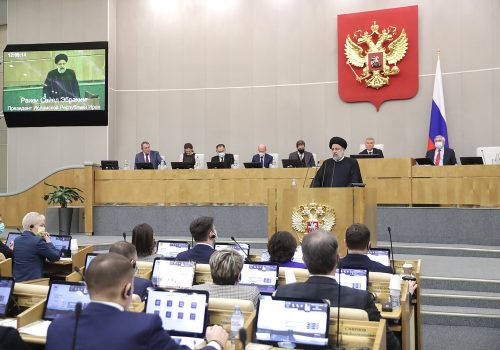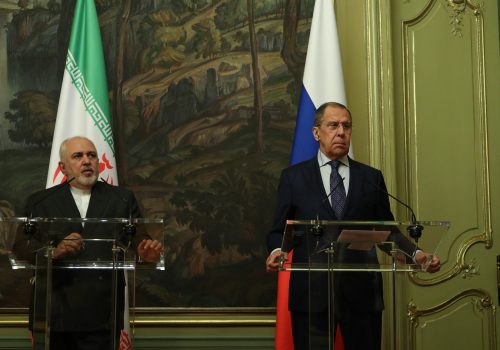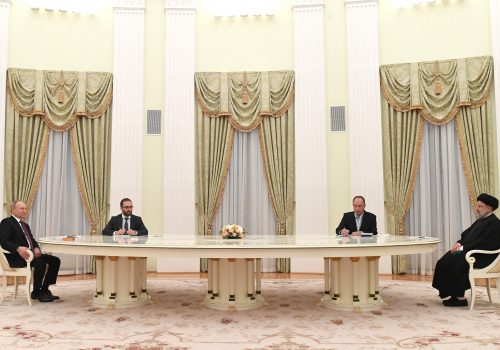Iran won’t break with Russia over Ukraine. Here’s why.
Russia has abandoned a recent attempt to exploit the Vienna talks to gain sanctions relief beyond what was guaranteed in the 2015 Joint Comprehensive Plan of Action (JCPOA). However, there are no signs that Tehran is walking away from its relationship with Moscow despite Russia’s actions toward Iran and its invasion of Ukraine.
Any improvement in Iran’s relationship with the West has always been a concern for Russia. Its March 5 demand for a written guarantee from the United States that trade with Iran not be affected by new US sanctions imposed on Russia for the invasion is the latest example of Moscow playing the Iranian card and jeopardizing Tehran’s interests to secure its own interests.
This isn’t the first time that Russia has used nuclear talks in such a manner.
Former Iranian Foreign Minister, Mohammad Javad Zarif, said in March 2021 during a leaked interview about Russia’s destructive role in the Iran nuclear talks: “The Russians have been trying to prevent the nuclear deal (JCPOA)since 2015 and [Foreign Minister] Sergei Lavrov wanted to disrupt everything on the night of the agreement. After the JCPOA, when Lavrov returned to Russia, he was attacked by the Russian media. Why did you allow this agreement to be reached and Iran to get closer to the West?”
On the other hand, Russia doesn’t want Iran to become a nuclear weapons state or be subjected to sanctions, since this would undermine trade and technical relations with Iran. Russia’s policy is to maintain crises that can be controlled and hinder the improvement of Iran-West relations.
As Ali Vaez of the International Crisis Group said in December 2021: “Russia is seeking to revive the agreement because alternatives to Russia are not attractive at all. If Iran goes to nuclear weapons, it is possible that some other actors and Russia’s neighbors, such as Turkey and even Azerbaijan, want to go in this direction, or the Arab countries of the Persian Gulf, and this will be a real big problem for Russia.”
However, Rajab Safarov, a former member of the Russian Federation Presidential Political Council and head of the Iran Commission at the Moscow Chamber of Commerce and Industry, said in March that a pro-Western Iran is far more dangerous to Russia than a nuclear Iran.
Russia fears that a further expansion of Iran’s nuclear program could lead to new conflict in the region and a bigger US military presence. It’s also in Russia’s interest that sanctions against Iran be lifted to expand trade relations in the form of a twenty-year cooperation document, while preventing Iran from improving relations with the West. Moscow also seeks Iran’s membership in the Eurasian Economic Union (EAEU) and Shanghai Cooperation Organization (SCO) (Iran’s membership process in the SCO takes about two years and, after the technical and legal process concludes, Tehran will formally join this organization).
“We are working on a draft of a new agreement between the two countries, which defines the principles of our cooperation in the international arena,” said Russian Foreign Minister Lavrov on March 15. “This document has increased the volume of economic relations with Iran by 82 percent during the sanctions period. No illegal sanctions can stop the escalating growth of Iran and Russia.”
Still, the Iran-Russia agreement hasn’t had much economic benefit for Iran so far. Trade with Russia currently accounts for only 4 percent of Iran’s imports and 2 percent of Iran’s exports—only about $4 billion a year. Tehran plans to increase its trade volume with Russia to $25 billion, but that goal seems overly ambitious.
Iran also sees the twenty-year agreement to strengthen its security cooperation with Russia and obtain new weapons. On January 21, Iran held a tripartite maneuver with the Russian and Chinese navies. Tehran is reportedly seeking to purchase Russian Sukhoi-5 fighter jets and the S-400 missile defense system.
The government of President Ebrahim Raisi also seeks to utilize a twenty-five-year cooperation agreement with China to bolster a “look to the East” policy first introduced by the administration of Mahmoud Ahmadinejad during an earlier bout of US-led sanctions.
Additionally, a February 27-published document on the transformation of the government of Raisi in Iran’s foreign relations doesn’t mention North America. This document does seek lifting sanctions but doesn’t view the nuclear deal as a basis for improving relations with the West. Iran’s political elites see the future of the international order as belonging to the East. They argue that cooperation with the West on issues such as Afghanistan and Iraq didn’t improve relations, as the George W. Bush administration labeled Iran an “axis of evil.”
The Raisi position isn’t universally shared in Iran. Reformists and even moderate conservatives as well as the middle class and many ordinary people have reacted negatively to the Russian invasion of Ukraine.
Domestic opponents see Iran’s long-term agreements with Russia and China as unilateral concessions comparable to the treaties of Golestan and Turkmenchay, in which imperial Persia gave up important territories in the Caucasus to tsarist Russia.
Accordingly, the content of these agreements has been kept secret, leading parliament speaker Mohammad Baqer Qalibaf to comment on January 26 that “a contract has not been legally concluded, otherwise the parliament would have been informed.”
Russia did abandon its effort to hold the Vienna talks hostage after Iranian Foreign Minister Hossein Amir-Abdollahian visited Moscow on March 15, but Iran appears to have granted concessions. During the visit, the two countries discussed cooperation in the Caspian Sea, the EAEU and the acceleration of Iran’s membership in the SCO.
It should be noted that Russia views its policy towards Iran as a package. In other words, Russia connects different issues and makes the support of one issue conditional on receiving concessions on another.
For example, Russia has linked its support in the Vienna talks to the Iranian ratification of a Convention on the Legal Regime of the Caspian Sea, signed on August 2018 at the Fifth Summit of the Caspian littoral states in Aktau, Kazakhstan.
Tehran had previously considered Iran’s share in the Caspian Sea to be 50 percent, citing a 1921 Treaty of Friendship and 1940 Soviet–Iranian Trade and Navigation Agreement, but then agreed to a 20 percent share. Per the median lines formula, Iran’s share is actually about 13 percent. However, based on the Aktau agreement, it would be 11 percent, according to former Iranian member of parliament Mahmoud Sadeghi.
The agreement benefits Russia by making Moscow the de facto naval power in the Caspian Sea, granting Russian warships the right to operate unhindered and barring the US from any military presence.
Russia uses the Iran card to create balance and gain points. Whenever Iran’s relations with the West improve, Moscow balances with gestures towards Iran’s rivals. On the other hand, whenever Iran’s relations with the West is bad, Russia approaches Iran and seeks closer ties.
Despite extensive Iranian-Russian cooperation in Syria, Moscow doesn’t want Iran to have widespread influence in Syria. Allied Iranian forces stationed near the Golan Heights have retreated under Russian pressure. Moscow also gives the green light to Tel Aviv for freedom of action in Syria. Days after Israeli Prime Minister Naftali Bennett traveled to Moscow and met with President Vladimir Putin, Israel assassinated two senior IRGC officers on the outskirts of Damascus in early March. Recent Israeli attacks on the Iranian-controlled port of Latakia reportedly include covert Russian-Israeli cooperation in Syria.
Despite Russia’s attempts to use relations for its own benefit and widespread international condemnation of Russia’s invasion of Ukraine, Iran isn’t walking away from its relationship with Moscow.
Iranian officials have refrained from condemning the Russian invasion of Ukraine and blamed the crisis on the United States and expansion of NATO. Raisi, for example, said on February 24 that he understands Russia’s security concerns; “NATO expansion is a serious threat to the stability and security of independent states in different regions,” the Iranian president told Putin.
In the United Nations General Assembly, Iran abstained from voting on a resolution condemning Russia’s invasion of Ukraine. The Raisi government appears committed to the “look to the East” policy, whatever happens with the JCPOA. It sees Russia as a strategic partner that is both a counterweight to Western pressure and a pillar for the survival of the Iranian political system.
Javad Heiran-Nia is director of the Persian Gulf Studies Group at the Center for Scientific Research and Middle East Strategic Studies in Iran. Follow him on Twitter: @J_Heirannia.
Further reading
Mon, Mar 7, 2022
As the world shuns Russia over its invasion of Ukraine, Iran strengthens its ties with Moscow
IranSource By
Iran’s support for Russian actions reflects the improvement in bilateral ties, which have grown considerably at the political and military levels over the past decade.
Tue, Jan 19, 2021
Does Russia really want a US return to the Iran deal?
IranSource By
The Kremlin has also backed European efforts to save the Joint Comprehensive Plan of Action since the US’s unilateral withdrawal from the deal in 2018. Below the surface, however, Russia’s views may be more complicated and ambivalent.
Mon, Jan 24, 2022
Iran’s new president just met with Vladimir Putin in Russia. What to make of it?
IranSource By Mark N. Katz
Despite the high-profile nature of this summit, little of substance seems to have been agreed upon.
Image: Russia's President Vladimir Putin (L), who arrived to attend the Gas Exporting Countries Forum (GECF), meets with Iran's Supreme Leader Ayatollah Ali Khamenei in Tehran, Iran, November 23, 2015. REUTERS/Alexei Druzhinin/Sputnik/Kremlin


